Mexicans unimpressed by cartel raids after student horror
- Published
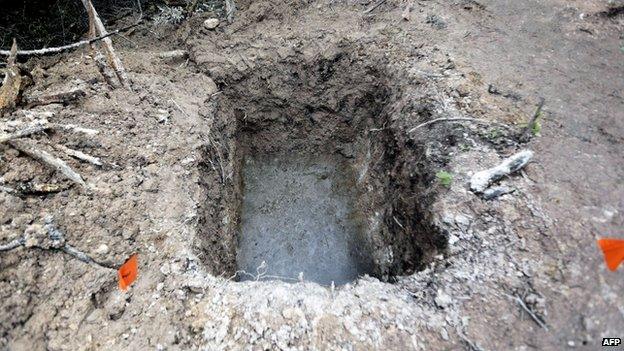
At least 28 bodies were pulled from graves like this outside Iguala last week
The grisly deaths of many trainee students in the southern Mexican town of Iguala is posing serious problems for President Enrique Pena Nieto, as the BBC's Mexico correspondent Will Grant reports.
Hector Beltran Leyva and Vicente Carrillo Fuentes: two of the biggest names from two of the most notorious families in the history of Mexican drug trafficking.
Under normal circumstances, the arrest of both men within days of each other would have been cause for great celebration and self-congratulation by the Pena Nieto administration.
Instead, coming as it does amid the horror in Iguala, it has looked like a hurried and misguided response to a much deeper crisis.
With each day that passes, the authorities unearth more details of brutality, and more bodies, charred beyond recognition and dumped in shallow graves in the small town in the western state of Guerrero.
But unlike Beltran Leyva or Carrillo Fuentes, these victims were not involved in the drug trade. They were teachers. Or at least they were training to be at the time they were seemingly carried off to their deaths by the local police.
'Hail of bullets'
Even to the hardiest drug war reporters in Mexico, the events in Iguala stand out as harrowing.
"We've seen many episodes of brutality in recent years", says Marcela Turati, reporting from Iguala for the Mexican weekly, Proceso. "But perhaps because they're students, this one feels different."
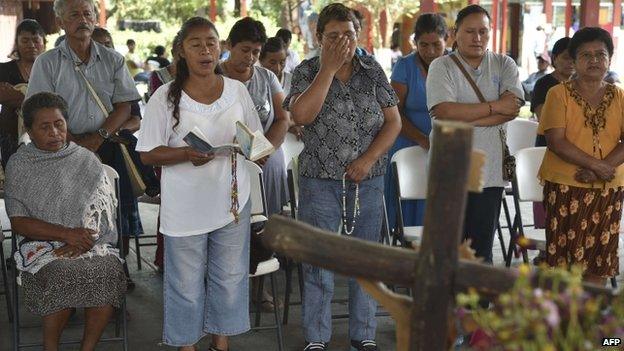
Parents of the students joined the search for their loved ones, but many fear the worst at this stage
The authorities are still to confirm exactly what happened in Iguala - or indeed, why - but the role of the police in the students' fates is undeniable.
During a night of protest by the students in late September over job discrimination in rural schools, the police opened fire on them and vehicles they were travelling in, killing several.
Among the dead was a member of a 3rd division football team caught in the hail of bullets as they returned home on a bus.
At the behest of someone - be it police chief, local mayor or regional drug lord - the students were rounded up by the municipal police, and have not been seen since.
"Here we can talk of specific criminal acts carried out by the police," says Ms Turati. "We know they first fired on the students. We don't know at what point they might have handed the students over to other criminal actors, but we certainly know from the videos that they took them."
Days later, the mass graves started to appear.
Narco-politics
Of those arrested over the abductions, 22 were local police officers. One of the detained men led the authorities to the graves and said the majority of the remains were the bodies of the missing students. The anguished families fear he is telling the truth.
Meanwhile the Mayor of Iguala, Jose Luis Abarca, his wife and his chief of police have fled and are wanted in connection with the attacks.
It is the extent of that "clear collusion" between the local authorities and the drug cartels, says journalist Marcela Turati, that has provoked the huge protests in Mexico City and elsewhere in the country.
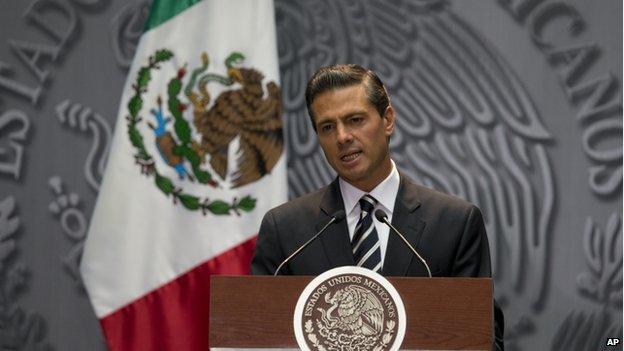
Mr Pena Nieto said there was no room for impunity in any society under the rule of law
"People are angry," she says. "This infiltration is part of the fabric (of society) here. This is what people mean when they refer to 'narco-politics' in Mexico."
Both the Guerrero state governor, Angel Aguirre, and President Pena Nieto have come under growing pressure over their handling of the crisis.
Critics say the security forces did not take victims' families' calls for urgent action seriously until it was too late.
The president has also been denied any sense of victory he might otherwise have enjoyed over the arrest of Beltran Leyva and Carrillo Fuentes.
Instead of applauding his security forces over the past week, Mr Pena Nieto has been forced to use words like "outrageous, painful and unacceptable" to describe their actions.
In fact, to an angry and cynical public, the arrests seem like the federal government knew where the big fish were all along, but were just waiting for a politically expedient moment to haul them in - something the government denies.
Warehouse killings
As a presidential candidate in 2012, Enrique Pena Nieto poured scorn on the drug war strategy of the outgoing president, Felipe Calderon, saying there was little point in chasing down drug kingpins because they would always be replaced by one of their lieutenants.
Far better, he said - his advisers nodding sagely - to reduce violent crime across the board and bring an end to the sort of savage attacks in Mexico which stopped people from leading normal lives.
Since then, however, he has presided over the capture or killing of the heads of almost all the major cartels: the leader of the Zetas, Miguel Angel Trevino, alias Z-40, the head of the Betran Leyva Organisation, Hector Beltran Levya, the head of the Juarez Cartel, Vicente Carrillo Fuentes, and arguably the most elusive and significant capture of them all, the Sinaloa Cartel boss, Joaquin 'El Chapo' Guzman.
Yet events like Iguala continue to happen. Indeed, the disappearances in Guerrero knocked out of the headlines the revelations that 22 people had been killed in what appear to have been extrajudicial killings by the military, inside a grain warehouse in San Pedro Limon, in Mexico State.
Both episodes involve astonishing levels of brutality apparently carried out by the security forces against unarmed people.
Today the president seems to be no closer to his stated aim of forever breaking the links between organised crime and the apparatus of the state than he was as a candidate.
- Published10 February 2014
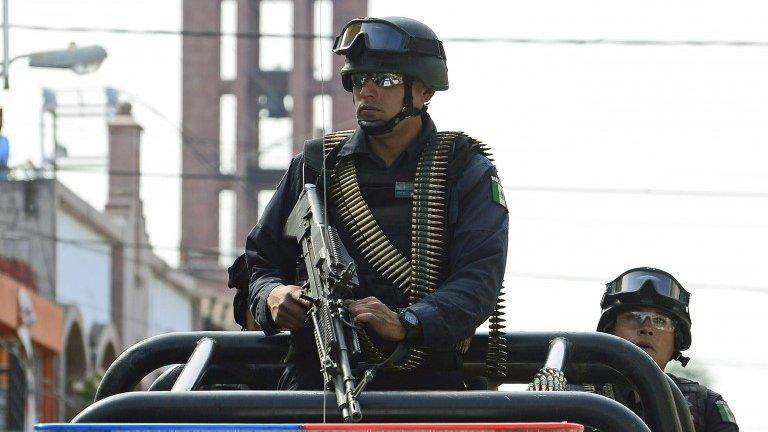
- Published4 September 2014
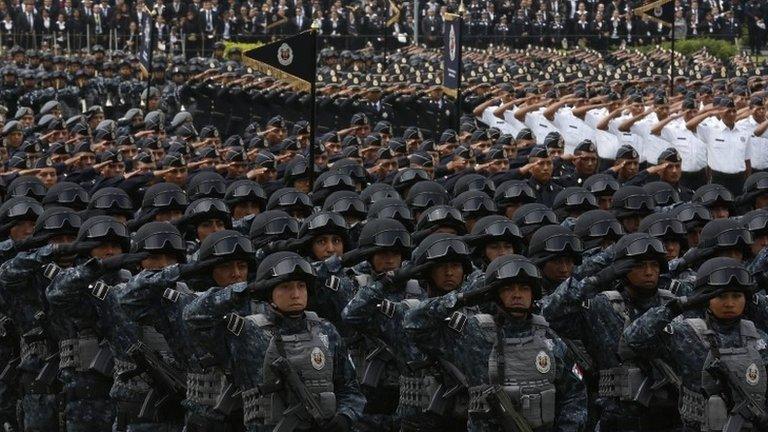
- Published12 October 2014
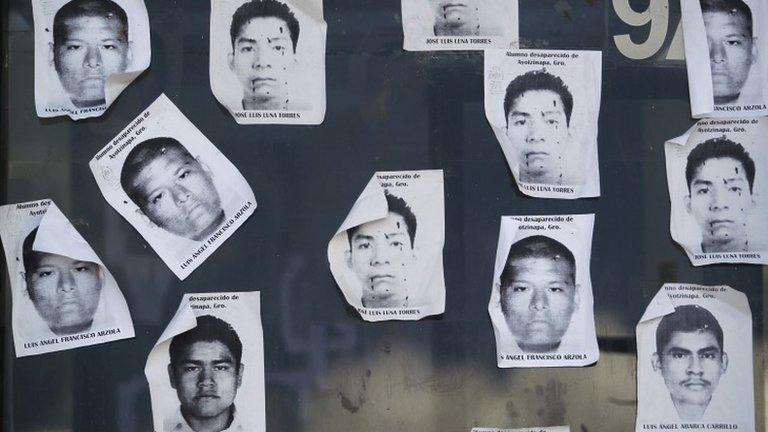
- Published2 October 2014
